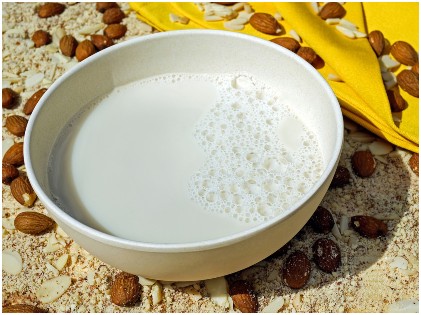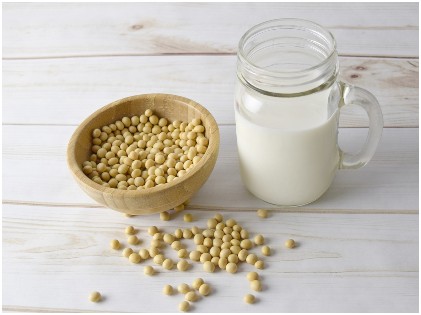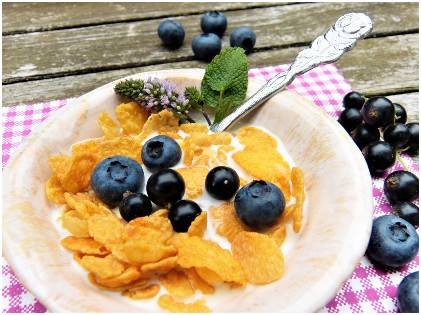We spent most of our childhood arguing with our mother, not wanting to drink milk. Well, we know that for the fact that milk boasts of amazing benefits and is a powerhouse of nutrients. But not everyone can digest milk very well, especially people’s development of healthy bones and teeth. Milk is a powerhouse of nutrients. It offers several health benefits to the human body.
But a few people may suffer from lactose intolerance and can cause discomfort immediately after consuming dairy products. This is known as lactose intolerance. It signifies the body’s inability may cause digest lactose, which is the main component of carbohydrates. Milk induced digestion may cause symptoms such as bloating, diarrhea, and abdominal cramps. So, what are your options? Well, fortunately, you have other options, and they taste great, if not more, so here are the options you can try.
Almond Milk
 Almond milk is a great substitute for milk. It is low-calorie, yet it is highly nutritious since it is rich in vitamin E and D. Also, it is lower in sugar. Since it is low in fat, it is also one of the better options for fat loss. Almond milk is a great alternative for people trying to reduce their intake of potassium and phosphorus because of underlying kidney disease.
Almond milk is a great substitute for milk. It is low-calorie, yet it is highly nutritious since it is rich in vitamin E and D. Also, it is lower in sugar. Since it is low in fat, it is also one of the better options for fat loss. Almond milk is a great alternative for people trying to reduce their intake of potassium and phosphorus because of underlying kidney disease.
Coconut milk
Coconut milk is delicious, and it also supports weight loss and is a great way to improve your metabolism. This milk is rich in vitamins such as C, E, B1, B3, B5, B6 and iron, selenium, sodium, calcium, magnesium, and phosphorus. Coconut milk contains lauric acid, a medium-chain fatty acid (MCFA) that your body converts to monolaurin, a compound boasting of antiviral and antibacterial properties. It is hence a great way to fight inflammation. It is also an option for the health-conscious or, should we say, the carb-conscious people who want great amounts of good fats in their diet. This is not very difficult to either mix solid coconut flesh with water to prepare the coconut milk.
Soy milk
 Soy milk is another protein-rich alternative to animal-based milk. It is rich in protein and can help up your protein intake. A great source of vitamin B, potassium, and iron, soy milk is rich in fiber, which helps lower your BMI levels and good cholesterol levels. This beverage is said to control obesity and high blood pressure. Soy milk combined with a low-fat diet and some soy protein is a great way to reduce fat and retain muscles.
Soy milk is another protein-rich alternative to animal-based milk. It is rich in protein and can help up your protein intake. A great source of vitamin B, potassium, and iron, soy milk is rich in fiber, which helps lower your BMI levels and good cholesterol levels. This beverage is said to control obesity and high blood pressure. Soy milk combined with a low-fat diet and some soy protein is a great way to reduce fat and retain muscles.
Oat milk
Oat milk is a vegan alternative to dairy milk. You can prepare it by blending water and oats, and then strain the liquid out. Some recipes may ask you to soak the oats for 30 minutes before blending to get a thicker texture.
However, others say that you only need to mix oat with water, and voila, you get oat milk! Oats also is a powerful way to reduce your cholesterol levels. This fiber-rich drink is creamy and smooth and can be a nice accompaniment with tea or coffee. Ensure you do not overdo it as it is slightly higher in calorie content than, say, almond milk.
Rice milk
 Compared to cow’s milk, it is a lighter option but has more carbohydrates than the latter. It isn’t as enriched with calcium or protein as cow’s milk. Therefore, most of the rice milk varieties available in the market are usually rich in calcium and protein and more vitamin such as vitamin B12, vitamin D, and iron. It has a mild sweet taste and another option for people with lactose intolerance.
Compared to cow’s milk, it is a lighter option but has more carbohydrates than the latter. It isn’t as enriched with calcium or protein as cow’s milk. Therefore, most of the rice milk varieties available in the market are usually rich in calcium and protein and more vitamin such as vitamin B12, vitamin D, and iron. It has a mild sweet taste and another option for people with lactose intolerance.
If you plan to add any non-dairy milk to your diet, you must be careful about the portion size. Also, always look for a good quality milk source. Not all store-bought milk options are good for you, as it may contain preservatives and additives that may cause more harm in the long run. You can prepare most of these dairy-free options easily at home. Look up recipes on the net, and you’ll find they can be made within a spate of a few minutes if you have all the ingredients. So, enjoy a cupful of dairy-free milk lead a fit and healthy life. However, do not forget to check with your dietician before switching to the new milk alternative.




